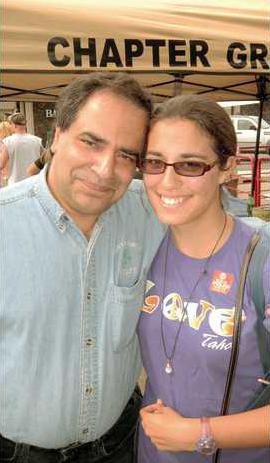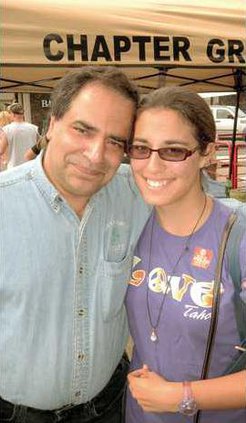RIPON — The value of life, the value of one’s faith, the determination to make the world a better place and to survive and prosper despite the challenges created by polio was an awe-inspiring message delivered at Saturday’s Main Street Day in Ripon’s downtown.
It was the sum total of a newly formed youth group, an iron lung used years ago for polio victims’ survival, and pictures of a 5-year-old child who spent her fifth birthday in the breathing apparatus and grew into adulthood making her mark in the world of education despite the effects of the disease.
Having been in Rotary for over 35 years, I was excited about seeing an iron lung for the first time. My only recollection was newspaper and magazine photographs I had seen growing up. Rotary International has been resolute in its continuing mission to see that the polio virus is eradicated worldwide. Ripon Rotary president and school district superintendent Louise Johnson was instrumental in getting the high school group up and running.
Advance news articles on the Rotary booth and its presentation of the old iron lung, credited with saving many lives in the mid-twentieth century, drew one polio survivor to Main Street Day to take another look. Etta Romkema brought her sister Margaret Deeter to see the lung and a large photo showing many of the devices from over 50 years ago filling a single polio ward – row upon row of stricken patients fighting to breathe.
Ripon resident was stricken with polio
Romkema left two small photos of herself taken over her fifth birthday week with her head extended out the end of the lung. She said it took all too long for doctors to determine the cause of her illness before being in the unit for over 10 months of her young life. The doctors had made house calls to treat her in October just prior to Halloween and, at first, they diagnosed her illness as being pneumonia – the polio diagnosis came later.
Interact Club teens in the Rotary tent Saturday morning were part of a new youth group being formed. It is a young group similar to Rotary that extends a helping hand in the community as well as being worldwide in its scope. The charter president of Interact is India Chakraverty whose mother has long been a teacher at Ripona School. Her dad is a sixth-grade teacher at an elementary school in Tracy.
Within minutes after leaving the Rotary tent, I ran into her dad, Arghya, and mentioned how impressive it was that his daughter was the first president of this new Rotary youth group. It was his response that made the day even more special for me as he retraced an almost miraculous turnaround in his teenage life and in his personal value system.
He had also been a president of an Interact Club in his small town of Hazaribagh in India in 1977. He said it was belonging to that group, while he attended St. Xavier High School, run by Australian Jesuits, which changed his outlook on God, about his future and about his fellow man.
He wanted nothing to do with a God figure back then and felt no remorse in ditching his Ethics and Morals classes in school. That all changed when he joined the Interact Club teen group and became involved in a project that touched the poorest of the poor frightened and hurting in the dark of night.
The club had partnered with a Lions Club group and its eye health project that was bringing American doctors to India to perform cataract surgeries. The Interact members were soon enlisted to serve patients their food and to watch them in as they recuperated on straw beds in a large but antiquated tented recovery area.
Request for water changed his life
Chakraverty recalled being awakened at about 2 a.m. with an emaciated man’s groaning and softly calling for help. He wondered why he should have to respond since he had worked hard all day – others could take care of him – he had done his part. But after the man’s pleas continued, he felt he had to check on him. The man was repeating one word: “water, water, water.”
The Interact president of some 34 years ago walked the length of the tent between the many beds of patients, completely in the dark, going outside where he filled an earthen cup with water. When he returned to the man’s bedside, he sat down and put the cup to the patient’s parched lips. The nearly toothless man showed his appreciation in his immediate reaction as he was sipping the water. He grasped Chakraverty’s wrist with one hand in a vice grip while the other reached for the boy’s forehead and over the top of his head, holding it there – a personal blessing of thanks.
The outreach to help the poor in their time of need had changed Chackraverty’s outlook – he felt in that moment that there definitely is a God – and without a doubt there was a need in the world to make a difference.
“Rotary changed my life. Before that I was anti-God,” he recalled of his encounter in serving the poor that night.
Now his daughter, India, and other Ripon High students are involved in the same type of Interact Club where they, too, will make a difference some three decades after her dad’s presidency. They are currently looking for more classmates to join their efforts in helping with an upcoming coat drive, stuffed animal drive, Pennies for Polio and the candle lighting at the American Cancer Society’s annual fundraiser in Ripon next Spring.
The little girl who is pictured in the iron lung back in the 1950s now lives in Ripon and voiced her willingness this week to help in the Rotary program in their support in eradicating the dreaded polio virus that continues today in the Third World. That’s why she donated the two pictures to the club that others might see them and react to the need for immunizations and support the Rotary mission. She stressed that the virus is still out there with eight or nine different strains and needs to be recognized and monitored.
Romkema recalls iron lung treatment
Etta Romkema said the 10 months she spent in the iron lung were difficult for her as a child with the continual prodding and poking every time she turned around. Friends and family members, other than her parents, would gather outside the hospital and look up at her ward where young Etta would be pushed inside her lung to a window of her second-floor room where she could see a returning small crowd of well-wishers waving as she peered through the mirror mounted above her head. Her parents were the only ones allowed into the hospital ward to see her – and they had to wear gowns and masks, she added.
Etta was ecstatic and outgoing on the phone this week. At the age of 65, she is still very much involved in life and is definitely computer literate. She’s an officer in a local homeowners’ association. She worked for years in a Southern California school district as health clerk moving up into human resources where she oversaw the preparation and issuance of teacher employment contracts. Etta said her doctor urged her to retire from the daily stress of the job five times before she took his suggestions seriously.
Despite the challenges that polio has left behind in one arm and in one leg, she has lived her life to the fullest, she says. She learned to water ski and among other things passed a private pilots’ ground school and became proficient at changing a tire on her car. She added it might take her longer to mow her lawn that it would others – but she gets it done.
“You can either just sit around or make a life for yourself,” she said of her polio recovery. Etta said she learned early on that it was her life and she had to make the best of it despite the fact people would tend to back away from her when they learned she had had polio. But, she added, that was the time when the mention of polio brought out instant fear in the hearts of many because they didn’t understand the virus that was found to be contagious only during its peak in a high fever.
She noted that there are post polio syndrome support groups that provide assistance for the survivors as they age – age complicates it, she added.
Now the prospect of speaking before Rotarians to bring them closer to the reality of the disease is giving her another new purpose for her future where she can once again make a difference. She said she eventually will have to use a wheelchair – “but not yet!”
To find out more about Rotary’s PolioPlus effort to eradicate polio worldwide go to rotary.org/en/EndPolio/Pages/ridefault.aspx
A cup of water in dark of night changed his life


Latest
-
 Reunions: Not as much a walk down memory lane as a reminder of what made us who we are
Reunions: Not as much a walk down memory lane as a reminder of what made us who we are -
 Will Ripon’s failure to support a fire parcel tax hike prompt Manteca to drop automatic aid?
Will Ripon’s failure to support a fire parcel tax hike prompt Manteca to drop automatic aid? -
 $60M bond assessed on homes south of the bypass would give angry SW Manteca parents ‘their’ school
$60M bond assessed on homes south of the bypass would give angry SW Manteca parents ‘their’ school -
 What would JC (Joshua Cowell) think of Manteca, the town he started, today?
What would JC (Joshua Cowell) think of Manteca, the town he started, today?